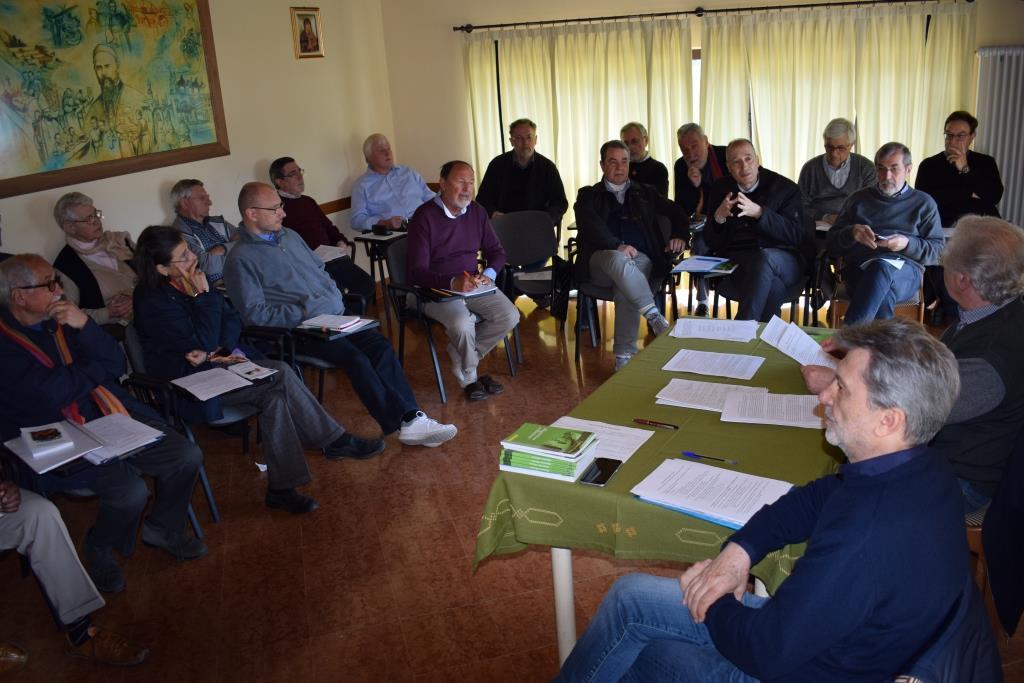Daniel Comboni
Comboni Missionaries
Institutional area
Other links
Newsletter
Wednesday, May 10, 2017
The theme of the 11th Symposium of Limone 2017, which took place on April 18-22 at St. Daniel Comboni’s birthplace in Limone on Lake Garda, was, “Migration and Mission. Towards a new Europe: from migrants to citizens.” About 40 members of the European Comboni family attended and they searched for pathways to a more accepting, fraternal, convivial and multi-cultural Europe. At the end of the symposium they decided to write a letter addressed to the Comboni communities of Europe. The letter, published below, is intended as a simple and small gesture of communion and sharing with our communities. The acts of the Symposium with all the reports, experiences and group work, will be ready in the upcoming months.
“Mom,
the barbarians
are at the door…”
Through the centuries this cry has been heard several times across Europe. They used to come in waves from far away and wild lands. They came looting, usurping the goods and the rights that in previous times many generations had toiled to achieve with much labor and sweat. They spoke unknown languages and dialects, dressed differently, and were wrapped in foreign smells and customs. Some would eventually go back to wherever they had come from, thanks be to God, but others had the audacity to want to stay and live in our lands, among us, with us, taking advantage of us. Inconceivable! If only they would go back home and leave us in peace, once and for all! We would defend ourselves from them at any cost, we did not want to lose or put to risk our world, our goods, our culture, our church, our way of life.
Over the last few days at Limone, while reflecting on Migration and Mission. A new Europe: from migrants to citizens, we came to realize that, all told, many people – even today, even among good Christians we meet in our churches, even within our missionary world – resonate with what we have just described. There are similar feelings, fears, intolerance, fatigue, rejections. It is fine to help, share and welcome, but too much is too much.
Even high level figures, such as St. Augustine, look at the migrations of their time with fear and a feeling of rejection. Augustine, however, eventually understood, ahead of his contemporaries, that the migrations of peoples within the boundaries of the Roman Empire – migrations that will result in the conquest and sacking of Rome in 410 AD – were not accidental events but life changing ones that would uproot the Roman world from its foundations, giving birth to a new era the details of which were not yet visible, but which would be nonetheless guided by the provident hand of God.
This was the basic intuition that stayed with us during the Symposium. The migrations are not a structural phenomenon, or a temporary phase. They are a challenge and also a resource. They are not a need and an emergency, but they are also an invitation to go beyond the borders and the human, sociological, ‘Christian,’ ecclesial and missionary categories that have up to now distinguished Europe. We go beyond the defensive walls of the “European citadel.”
Migrants and migrations represent a time of full blown ‘crisis’ and, just like all crises, albeit difficult and painful, they open us to a new way of feeling and of living, to make room and to contribute to shaping a new image of society and of Church (a new people), to new processes of reconciliation, to a new definition of the anthropological terms and contents of integration.
This is a crisis that compels us to give difficult assents, to look at the immigrant more as a protagonist and a gift, to grow in a spirituality of frontier, of the margins and to start on a journey of conversion and of dialogue. We need to move from a charity point of view to criteria of justice; from mono-ethnic churches to churches that are truly catholic; from defending our acquired rights tooth and nail to greater sharing and acceptance, in order to discover that we can live with less without life being worse, in fact arriving to a good life.
We, the missionary world, feel called once again to be bridges, to offer to differences meeting venues to meet and be reciprocally transformed. We must start by questioning our current way of life, our socio-cultural and economic models in ways that are more radical and more open than at present. Limone has encouraged us along these pathways and this awareness. We would like to share them with you, in simplicity and fraternity.

About 40 members of the Comboni Family gathered at St. Daniel Comboni’s birthplace in Limone to hold,
from the evening of April 18 to the morning of April 22, 2017.





